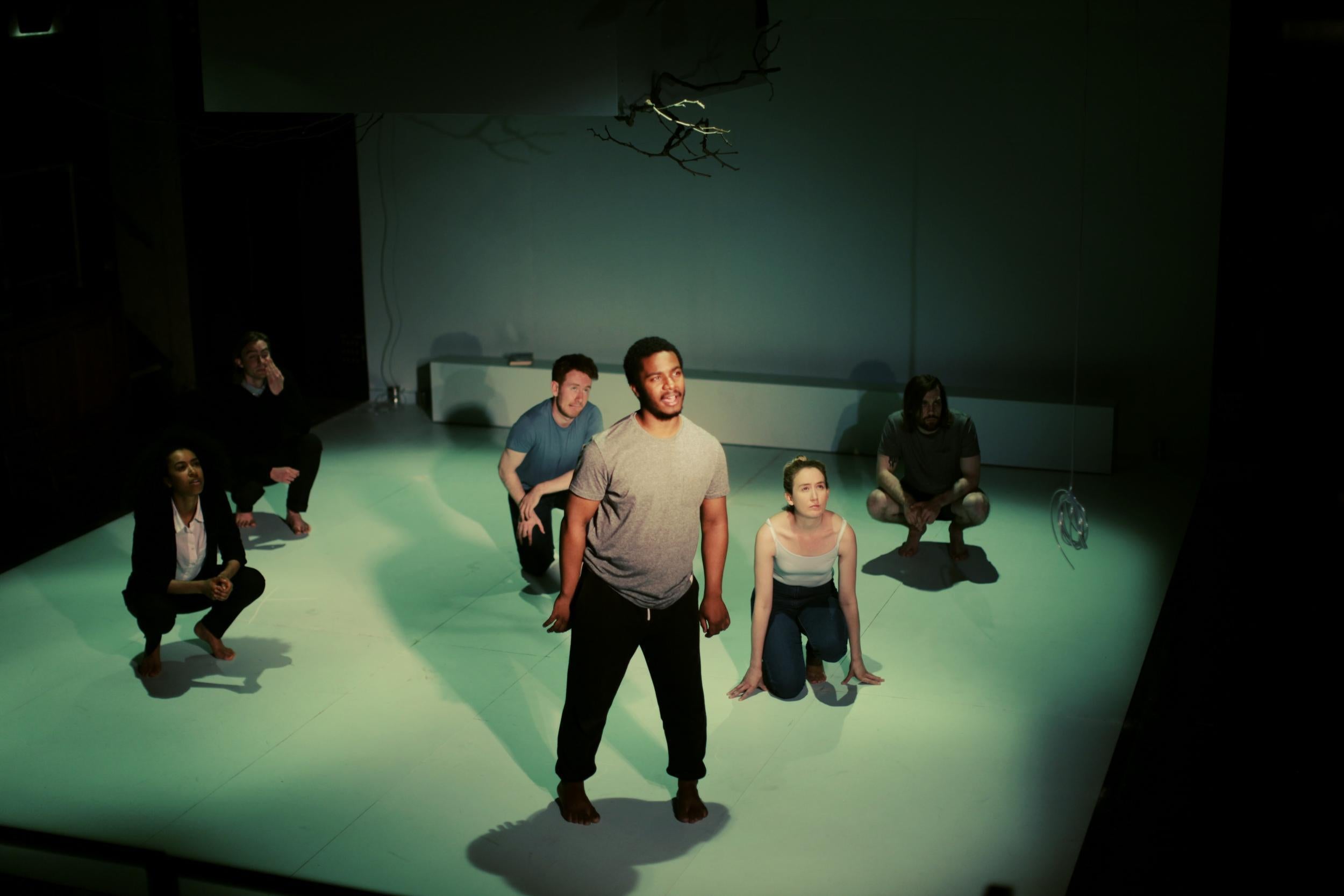The Enchanted, the Bunker, London: A frustrating plot that presents a naive and blinkered perspective on murderers
This adaptation of Rene Denfeld’s novel is an oddly casual, underdeveloped production on the morality of death row inmates

It takes a village to raise a murderer: that’s the message The Enchanted repeatedly pushes at the audience.
For this, a roving narrator crawls about the stage, drawing chalk lines onto the white floor and walls, and speaks like an out-of-time prophet about the death row inmates surrounding him.
The Enchanted is both an underwritten and yet overly wordy production, adapted from the novel of the same name by Rene Denfeld. The production, by Pharmacy Theatre, comes to London after a successful run at 2016's Edinburgh Fringe.
The audience follows the case of York (Hunter Bishop), whose crimes along with those of his fellow inmates are neatly glossed over so that the audience might “umm” and “ahh” about the brutality of the penal system.
Along with our omniscient inmate narrator, the audience witnesses the five months in which a death row caseworker “the Lady” (Jade Ogugua) attempts to convince York to retract his decision to welcome his execution.
With such a rich topic it is surprising how much of this feels like a missed opportunity for a great play.
Corey Montague-Sholay as the narrator seemed to have chosen to speak with a tone of wonder, making every line sound like it was his first line. With all of the characters it felt as though the audience never got passed the first-page descriptions. Even revelations about some of the minor parts came so late in the story that it felt like tacked on depth. The revealed back stories did not produce a gasp or a re-evaluation of scenes gone by, but a feeling of frustration.
Liam Harkins as Troy was sadly underused, but he gave a nuanced performance of a guilty coward who fled horror. Harkins’s scene with the Lady as she investigated York’s horrific upbringing in generic small-town America was the most compelling portion of the play.
Worth praise is movement director Emily Orme for a well choreographed sequence that communicated the repetitive journey the Lady makes to York’s hometown, which the play presents as the source of his abusive acts.
The use of puppetry for flashbacks was well executed, and brought a chilling tone to these scenes. The puppets were plainly dressed, like witness protection dolls, subtly communicating the duality of abuser and abused.

Most of all there were problems with the morality of this play, in the manner in which it conveniently ignores the murderers’ victims, and focused entirely on the murderers as victims of society. While rightly avoiding portraying the death row inmates as inhuman monsters it ended up, rather uncomfortably, implying they were somehow angelic. This was to the extent that in scenes of execution the actors’ bodies even took the shape of crucifixes.
Moreover, Montague-Sholay’s narrator is an inmate suffering from a form of mutism who appears to have divine sight and a Christ-like omniscience of the world. This device, of a person with mental illness knowing more than their “sane” captors, and being some kind of divine creature, felt lazy to the point of exploitation and bordered on being offensive.
One such example is the recurrent theme of the inmates, although tortured creatures, still appreciating beauty in the skyline, or the magic of novels. It felt patronising to say the least.
There also appeared to be a missed opportunity regarding the weighty topic of death row and the prison population. The disproportionate number of African Americans incarcerated in the US is never once a part of the picture.
The Enchanted had moments of real tenderness but was too clunky in its execution elsewhere that the final product was all the more frustrating to watch.
Join our commenting forum
Join thought-provoking conversations, follow other Independent readers and see their replies
Comments
Bookmark popover
Removed from bookmarks